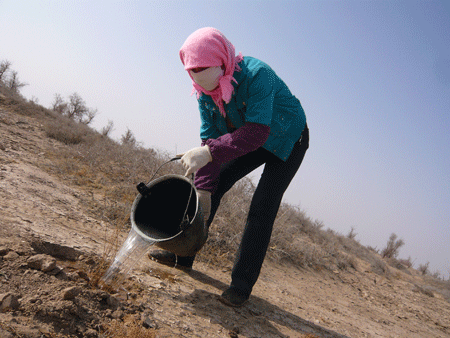Is internet a bad thing?
The girl was confused, asking Wu Zhiping what did she think of the Internet: Is it a bad thing?
The 13-year-old had just tried to kill herself after being raped by a young man she had met online.
|
|
|
Urban Web surfers can see their tree online in Minqin county, Gansu Province. Photo: Courtesy of Saving Minqin |
Rural Women NGO volunteers offered counseling and the youngster recovered well. Ever since then, she has been kept under tight scrutiny by her father, angry whenever her focus strays off her studies.
A project aided by the United Nations, Wu's NGO carries out much-needed sex education for underage girls, often the kind who are left at home by absent rural parents gone to work da gong in the cities.
"The Internet in China carries social stigma among parents and educators," said Wan Tao, founder of NetEasy, an NGO on Internet security.
"In fact, the Internet is neutral and shouldn't be blamed."
Also known as the "godfather of Chinese hackers," Wan is trying to help 500,000 young hackers in second and third-tier cities out of the business.
Rural Women since 2007 has trained 3,000 uneducated women in seven provinces to use the computer and the Internet, setting up book clubs and mutual assistance networks.
It was perhaps inevitable that such a booming volunteer culture, one that revolves around sharing and participation, hit a wall in the Chinese mainland.
There are times when technology can't solve everything, Lu Fei revealed at the ICT Innovation Workshop sponsored by Intel China last weekend.
After Liu Xiaobo won the Nobel Peace Prize on October 8, the NGOCN communication platform for NGO workers was shut down briefly without notice.
"We tried our best to censor the contents until our hands got sore," said Lu, one of 40 NGO leaders at the meeting.
"However, it happened anyway."
 0
0 







